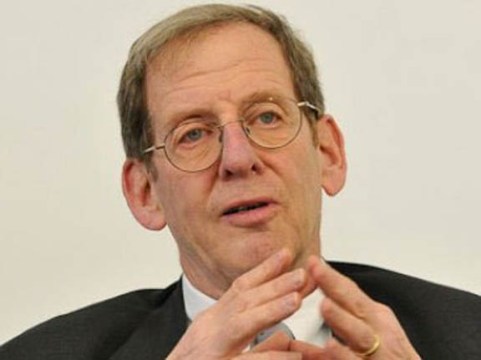Azerbaijan and Turkmenistan have right to lay Trans-Caspian pipeline, U.S. ambassador says (UPDATE)

By Aynur Jafarova
Azerbaijan and Turkmenistan have the right to lay the Trans-Caspian pipeline and the U.S. in general agrees with it.
"The U.S. position is that if the two countries reach an agreement there would be no obstacles to laying this pipeline," U.S. Ambassador to Azerbaijan Richard Morningstar said in Baku during the conference on the topic "Maritime and Energy Law in Azerbaijan: international and national perspectives", Trend news agency reported.
The Trans-Caspian Gas Pipeline running around 300 kilometers will be laid from the Turkmen coast of the Caspian Sea to Azerbaijan, where it will be linked to the Southern Gas Corridor. The pipeline's capacity is 30-40 billion cubic meters of gas per year.
However, each country should determine for itself the political implications of each attempted step in this direction, he mentioned.
The U.S. ambassador also noted that the pipeline should be safe from the ecological point of view.
Iran and Russia expressed their negative attitude towards the project. Tehran and Moscow think the pipeline construction may damage the Caspian Sea's ecology.
According to Morningstar, the compromise is necessary with regards to the issue of delimitation of the Caspian Sea.
The legal status of the Caspian Sea, which is surrounded by five countries - Azerbaijan, Kazakhstan, Russia, Turkmenistan and Iran, has not yet been determined yet. A number of talks on this issue have been held in previous years and negotiations are underway.
He went on to say that some sanctions could have been imposed with regards to the Shah Deniz field due to a 10 percent stake of the Iranian Company NICO in the project. Sanctions could have been imposed over cooperation with the Iranian Oil and Gas Company. However, the U.S. Congress considered the compromise more expedient, the ambassador said.
The Western countries have repeatedly accused Iran of pursuing non-civilian objectives in its nuclear energy program, whilst Iran rejects allegations saying it is entitled to develop nuclear technology for peaceful purposes.
Furthermore, Morningstar told journalists that the U.S. would be happy to see the Trans-Caspian gas pipeline to be implemented.
Meanwhile, he said that ultimately it has to be an agreement among the EU, Azerbaijan and Turkmenistan.
Morningstar noted that it is up to Azerbaijan and Turkmenistan to make a decision in this regard and whether they can reach an agreement with the EU to move forward.
If Turkmenistan and Azerbaijan agree with the EU to build the pipeline, they can do so, because the pipeline will go through the waters that will only be either Turkmen waters or Azerbaijani waters, he said.
Earlier Turkmen Deputy Prime Minister and Foreign Minister Rashid Meredov said that Turkmenistan, Azerbaijan and the EU conduct serious substantive work in a trilateral format to draft a document on main principles of gas supply from the Caspian region to Europe.
"The reliability of supplies to Europe directly depends on how we form our partnership scheme," he said.
Talks on the construction of the Trans-Caspian Gas Pipeline between Turkmenistan, the EU and other countries have been held since late 1990s. The negotiation process intensified after the EU issued a mandate to start negotiations on the preparation of an agreement between the EU, Azerbaijan and Turkmenistan on the Trans-Caspian project in September 2011.
Official Ashgabat believes that the agreement of the parties (Turkmenistan and Azerbaijan), territories of which are covered by the project, is sufficient for laying the pipe under the Caspian Sea. Baku has expressed readiness to provide its territory, transit opportunities and infrastructure for its implementation, as reported by the representatives of the State Oil Company of Azerbaijan (SOCAR).
Azerbaijani Energy Minister Natig Aliyev said earlier that drafting of two documents under the Trans-Caspian gas pipeline project is drawing to a close and they must be signed by Azerbaijan and Turkmenistan's presidents and head of the European Commission, as well as the governments of the two littoral countries.
The first document will feature the support to the project by the three sides, while the second one must be signed between the Azerbaijani and Turkmen governments.
The minister noted that Turkmenistan has expressed its support for the project implementation. This means the Turkmen side is ready to deliver around 30 billion cubic meters of gas for the project. In turn, Azerbaijan is ready to ensure all conditions for the transportation of Turkmen gas.
Earlier in February Russian Ambassador Vladimir Dorokhin said that Russia has no questions concerning Azerbaijan's position on the construction of the Trans-Caspian gas pipeline.
"There are the positions of Russia and Iran who believe that Trans-Caspian pipelines can be built if the environmental expertise is agreed upon by all Caspian littoral countries. Azerbaijan, Kazakhstan and Turkmenistan believe that the environmental expertise must be approved only by the parties involved in a particular project. We believe that it would not be appropriate to launch any specific projects until the Caspian littoral countries agree upon these issues themselves," he underscored.
Vice President of Azerbaijani state energy company SOCAR Elshad Nasirov said that Azerbaijan will only benefit from transportation of gas through the Trans-Caspian gas pipeline.
"Implementation of this project will make Azerbaijan not only a supplier of gas, but also a transit country. This is a very ambitious project for the EU," Nasirov said.
According to Nasirov, implementation of the Trans Caspian pipeline project will be possible as soon as Turkmenistan and partners from the EU agree on gas sales.
Here we are to serve you with news right now. It does not cost much, but worth your attention.
Choose to support open, independent, quality journalism and subscribe on a monthly basis.
By subscribing to our online newspaper, you can have full digital access to all news, analysis, and much more.
You can also follow AzerNEWS on Twitter @AzerNewsAz or Facebook @AzerNewsNewspaper
Thank you!
